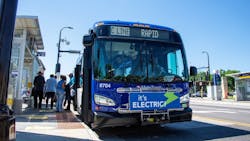Met Council projects advance electric vehicle adoption in Twin Cities region
The Metropolitan Council (Met Council) is working to advance electric vehicle infrastructure in the Twin Cities region through an electric vehicle planning study and Metro Transit’s continuous work to transition to an electric fleet.
“Transportation is the leading contributor to climate change in Minnesota and across the United States, and electric vehicles are one of the most important tools we have to reduce the pollution impacts in our communities,” said Tony Fischer, Met Council planning analyst.
Identifying strategies to accelerate electric vehicle adoption
The study will identify policies and investments that can help build an electric vehicle charging network that makes sense across city borders.
It will lay the groundwork for electrification by studying:
- The changing technology landscape;
- Supportive actions regional partners can take;
- The investment needed to build and run a charging system;
- Positive impacts on climate change and public health; and
- Hurdles for adopting the technology.
Future regional investments, policies and other Met Council work to accelerate electric vehicle adoption will be informed by the study. Met Council is conducting the story in conjunction with a similar statewide Minnesota Department of Transportation study and is expected to be complete in early 2022.
Electrifying the Metro Transit bus fleet
Metro Transit has been moving to greener operations since 2002 as one of the first adopters of hybrid-electric buses. As the region’s largest transit provider, Metro Transit also has been making strides to reduce the emissions of its diesel fleet, reducing emissions of particulate matter and nitrogen oxides.
Metro Transit committed to an order of 60-foot electric buses to pilot on the METRO C Line, partially funded through a $1.75 million Federal Transit Administration Low or No Emission Vehicle Program grant. Performance and reliability issues, particularly with the charging infrastructure, are being worked through with the manufacturer.
“Now we are developing a zero-emission bus transition plan,” said Carrie Desmond, principal engineer. “This will lay out a framework for transitioning to zero emission bus technology and prioritize discreet projects for implementation. Three principles will guide the plan: technical viability, equity and financial impact.”
Desmond notes the first iteration of the plan will be completed by February 2022.
“This will be a living plan that will be updated regularly as things evolve,” Desmond said.
Metro Transit received another federal Low or No Emission grant this year, which will be used to purchase eight, 40-foot electric buses to be deployed in local service beginning in 2023.
